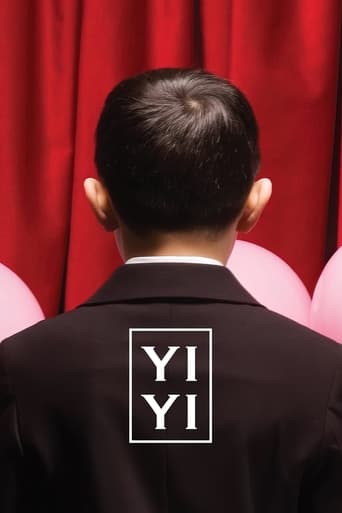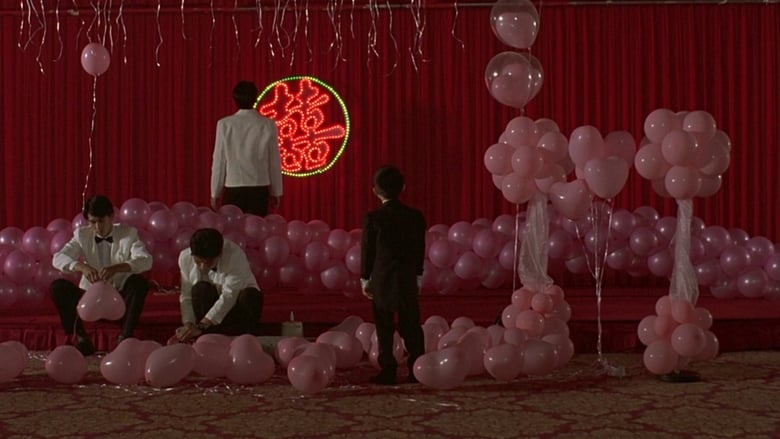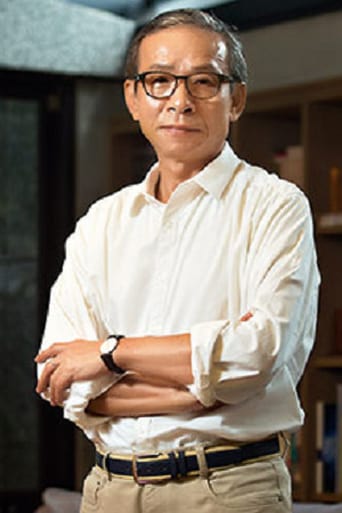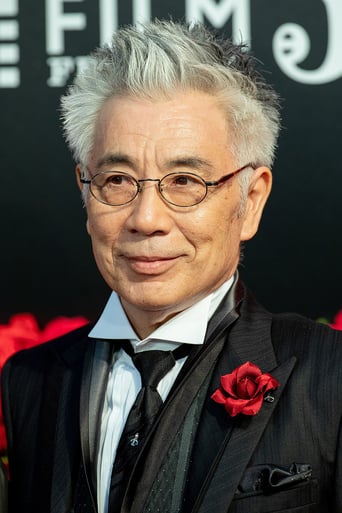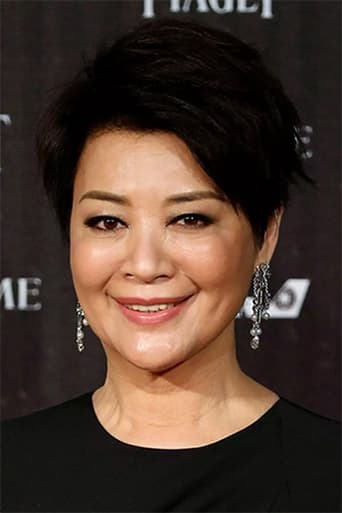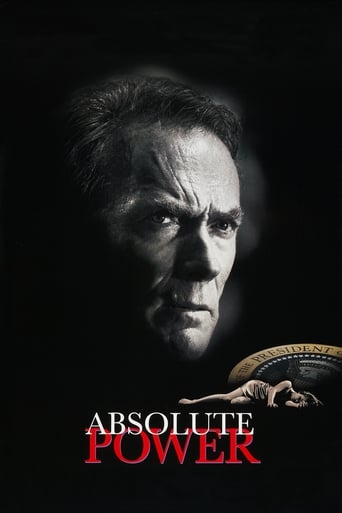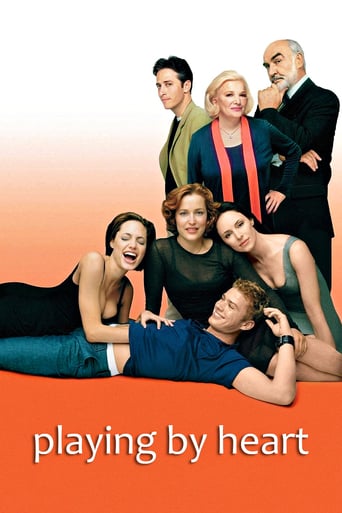Yi Yi (2000)
Each member of a family in Taipei asks hard questions about life's meaning as they live through everyday quandaries. NJ is morose: his brother owes him money, his mother is in a coma, his wife suffers a spiritual crisis when she finds her life a blank and his business partners make bad decisions.
Watch Trailer
Cast


Similar titles
Reviews
Touches You
Pretty good movie overall. First half was nothing special but it got better as it went along.
This is one of the few movies I've ever seen where the whole audience broke into spontaneous, loud applause a third of the way in.
A movie that not only functions as a solid scarefest but a razor-sharp satire.
I took deep breath after i finished of this: A TRUE MASTERPIECE."Did you like the movie?""A bit too serious.""You prefer comedies?""Not really, but it didn't have to be so sad""Life is a mixture of sad and happy things."Since i watched the first film in my life and that's was when i were 13.y.o i guess, it seemed to me like i were just started to walks as a child. It makes me thinking about it every day, and all those happenings which happened at the past it still stuck in my mind so far."If I missed seeing you, I'd feel bad all day."I was thinking if i was born just for watching the films and that is will be the same thing day by day, WHY i born and living in this depressing life? I were thinking if i created for particular purpose, WHY i'm here and have nothing useful to do or even something make me a normal person like anyone?In this film i found myself already, and it was a heart-breaking and so adorable. But that's not strange at all, because, i were watched two of a pure films for that name which you should to remember it always, when you want to talking about the realism and the pure cinema, it is one of the greatest/perfectest directors that will not leave you disappointed after you finished of its films, the name is: EDWARD YANG. From now on it'll be existing in my mind and my thoughts, his films it weren't made for the joy or fun at all, it were made with a serious stories and powerful purposes, Edward yang's cinema is: a purposeful, very genuine, too enthralling, so realistic, and too memorable. I have never spent an excellent time with any film as i have spent with this film and the other film: A Brighter Summer Day particularly. Actually, this film is one of those films which i can easily to say about it: it is the best film at the 21st century. It is has one of those a real stories which no one can skip it without any a huge sad reaction.Edward yang the masterful filmmaker which he can reach to your feelings out and moving it with an easy way. Also, he made two of films which i gave it a full score, A Brighter Summer Day and Yi Yi, these films it's necessary that any addicted-films or lover-films or even just a normal people to watch these films as soon as they able to."Daddy, I can't see what you see and you can't see what i see.""How can i know what you see?""Good question, i never thought of that.""That's why we need a camera.""Do you want to play with one?""Daddy, can we only know half of the truth?""What? I don't get it.""I can only see what's in front, not what's behind.""So I can only know half of the truth, right?""You have a lot of question today!"Edward Yang's Yi Yi's dialogues is masterfully pure, a fully genius. In fact, the whole film was: thoughtful, an epically sleek, an equally important, and very calm and has too many of pain and love in its story. It is always has a deep characters behind its idea, either. All what i can say that i want to writing about this a masterpiece non-stop, and i will re-watch it again and again until it comes that moment which i'll be saved all the film in my memory.R.I.P Edward yang.
YI YI is one of the most celebrated movie of the 2000's and the last film of Edward Yang which was shot in Taipei city. It is really a beautiful piece of art cinema.The movie revolves around the life of middle aged partner in a computer firm Mr. N.J. Jian(Nien Jen Wu) and his family. The movie features a marriage, childbirth, suicide attempt, murder and finally a death. It shows how with change in time the cultures and traditions are left behind but still same story repeats from generation to generation, from N.J.'s life to his teenage daughter, to his little son in primary school.The movie is quite long, slightly less than three hours, and moves at a slow and even pace. There is no build up or climax scene which represents its proximity with the real life. Being an art film, it does not follow any standard techniques of narration, camera techniques or story telling and relies hugely on director's own creative genius. At many instances the camera takes long reflective shots from outside rather than accompanying the characters giving us a feeling of outsider watching everything happening but are not actually a part of it. The use of reflective shots with the huzz and buzz of city in background shows that everyone has his own problems in life and no one has time to stop for anyone.Everything in the movie has a deeper meaning associated with it when looked at closely. Even the innocent talks of the little Yang Yang(N.J.'s son) have one of the biggest truths of life which are ignored by everyone. The whole movie talks in metaphor. The phenomenon of lightning is used to show the emerging love in Yang Yang for the class monitor. Also Yang Yang clicking the photos of the back of head of people to show them what they can't see has a deeper meaning.Overall the movie was really a masterpiece, though quite longer than the normal. The creativity of the director makes this film with a very normal story outstanding. The most peculiar point in the film is its closeness with the actual life which helps in building a connection with the audience. The movie is not just a story, it is an experience which you enjoy every time you recall a part of it.
Once again misled by the laurels on the DVD cover.I should know by now to avoid films that arty critics rave about. The same with The Tree of Life, totally overrated typical of arty Venice film festival Palme d'or winners. e.g. ,Blue is the warmest colour, The white Ribbon Leave etc; Leave domesticity and art to the French its their forte. But this film all so depressing overlong and meanders. No wonder it was not released in Taiwan. And it means one one not One and two or either some ones name. I am a great fan of Asian films but this one does not even begin to touch The Professors favourite Equation (, The House maid, Ip Man, Assembly, My sassy Girl, Hello stranger, Money not Enough. These films not only entertain but give us a great insight to Asian thinking and society without the depressing slowness of Yi Yi
The passing of a great filmmaker is always greeted with sadness. Edward Yang was no exception. One of the most influential of Taiwanese filmmakers, Yang belonged to a class of film directors whose films resonated strongly with the society he lived in. He made a number of pictures during the 1990s, but his most lasting legacy was Yi Yi, a film released at the turn of the century (or millennium if you will), which, through the perspective of a single, but extended, middle-class Taiwanese family, provided viewers with an honest and insightful reflection of living in a modern, technological age.Structured around three very important cultural ceremonies, namely the wedding, the baby shower, and the funeral, the film brings as many characters as possible to the fore, and then breaks them up into smaller "units" for an in-depth study of their lives. This congregation and dissection of characters is the reason Yang's film is essential viewing for anyone who wishes to see a slice of themselves on screen, portrayed to a very realistic effect.Expertly developed, the elaborative narrative may seem deceptively complex but it is really just a series of simple observations of daily occurrences spliced together on film. Shot with honest objectivity, Yang's film sometimes also spotlights on the subjective emotions of certain characters, most notably that of Yang Yang (a somewhat reserved boy with a camera), his school-going sister (who discovers the fleeting emotion of love for the first time), and their morally-guided father (a mid-level boss of a corporation who meets an old flame).Of course, in a film like Yi Yi, which spans nearly three hours, these characters are multi-dimensionally developed. So much occur in their lives that their ups and downs captured in Yang's film are merely a "cross-sectional" view of their current circumstance. Apart from the above-mentioned cultural ceremonies, another common point that ties all the three main characters together is the grandmother, who suffers a nasty fall and enters into a coma. Interestingly, the unresponsive grandmother becomes sort of a "human mechanism" for catharsis, especially for the father and the daughter.Yang Yang, on the other hand, refuses to talk to his grandmother. He reasons that she is old and would probably know everything he would say, so why bother telling her things that she already understands. His relationship, or the seemingly lack of one, with her would become immensely meaningful towards the end of the film, cumulating in Yi Yi's most touching and thought-provoking moment – the recitation of a piece of self-written text by Yang Yang to his dead grandmother during her funeral.In quite a number of scenes, director Yang employs long shots to keep viewers a certain distance away from the characters. Although we could hear the (slightly fainter) dialogue, we are unable to observe the subtle facial reactions that would help us to register the feelings of these characters. In other instances, Yang uses mediated images, like that of a security camera, to capture the movements of the characters, highlighting the increase in surveillance in today's society.Yang also makes use of glass panels (of windows, doors, and walls) to create a "double-screen" effect. These glass panels give an added screen to the lens of the camera, further separating the viewer from the actors, forcing upon us the role of a "contemplative observer" as opposed to being a "willing participant" in the lives of these characters. The dual reflection of objects within and outside these glass panels sometimes produce naturally superimposed images; this is most beautiful during scenes shot in the night.I feel that Yi Yi's most important message comes from Yang Yang's camera, which is given to him by his father. He takes pictures of the back of people's heads, reasoning that these are images that people could never see, and explaining that a person's view of the world is always halved (i.e. never complete) because of this. This change in social perspective from an innocent boy after receiving the camera parallels that of the director's use of the film medium to reveal that life is often treated with so much subjectivity that an objective worldview is sometimes difficult for us to fathom. In three hours, Yang conveys that message very convincingly. But three hours is never enough for something that often takes us a lifetime to recognize. There is a word for it – it's called wisdom.SCORE: 9/10 (www.filmnomenon.blogspot.com) All rights reserved!

